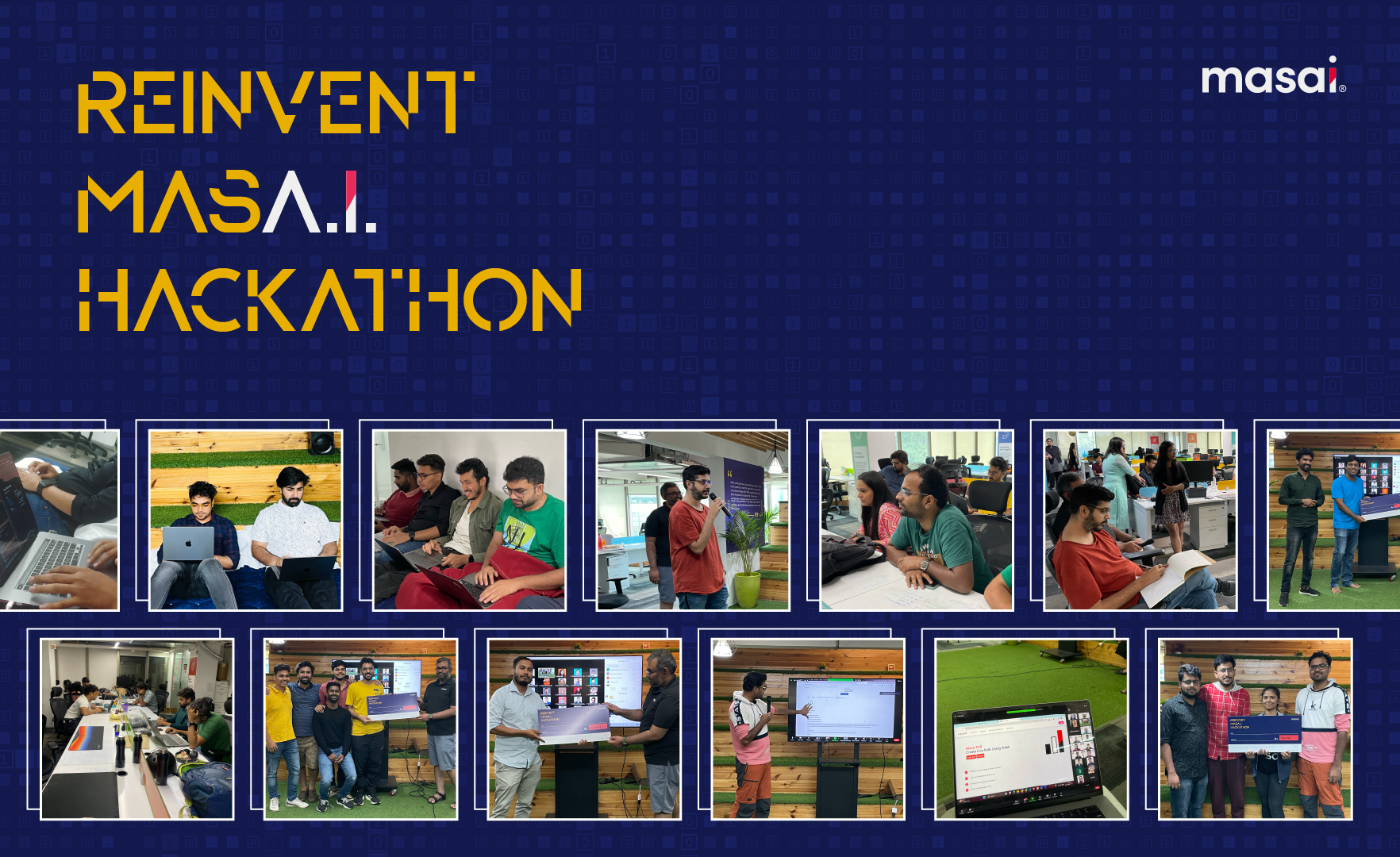Harnessing the Power of Generative AI: Redefining Education at Masai School
Masai witnessed some amazing, innovative solutions, powered by AI, that have the potential to take us forward.

Authoured by: Albert, Director of Platforms & Outcomes
Masai saw some incredible, cutting-edge AI-powered technologies that might advance society.
It is eager to incorporate these models into our educational framework to give personalized feedback and promote a focus on knowledge. They play a crucial role in redesigning the existing educational landscape.
Generative AI is currently playing the role of a disruptor in every sector, especially so in the field of education. It holds the power to completely reimagine the current education landscape with an unlimited gamut of new ideas and opportunities. We at Masai wanted to explore these opportunities using our best resources – our brilliant colleagues. And that’s how the Reinvent Mas.A.I Hackathon came to be – a four-day event that saw 16 teams put their minds to the test to solve 11 problem statements using AI. The goal was simple: reimagine Masai, reimagine education.
Our teams enthusiastically tackled a broad spectrum of problems, focusing on solutions that could enhance both the students' classroom experience and the tutors' instructional strategies. We saw innovative ideas for personalised lesson plans, AI-assisted homework help, interactive virtual classrooms, and tools for interview preparation and revision. It was thrilling to witness our team members' excitement when they discovered new applications for GPT that hadn't occurred to us before. We took away a greater understanding of Large Language Models (LLMs), fostering an appreciation of the broad array of solutions that AI offers.

Some of our biggest breakthroughs were building a Learning Assistant that helps students in individual study, like a personal tutor; a Hybrid Learning App that combines AI, audio, and video learning modules to help create a customisable learning experience for students; and a Student Prep and Job App that helps students make their portfolios and resumes as well as preparing them for interviews. These and many other innovative solutions got us looking at our work through a new lens, opening our minds to new solutions and possibilities.
By working through some of the major problems plaguing the edtech and jobtech space right now using the help of Generative AI, we realised that we have a unique opportunity to craft more personalised and engaging learning experiences for today’s students, who are already tech-agnostic. AI can tailor learning to each student's pace and style, provide real-time feedback, identify gaps in understanding, and suggest further learning resources. This opens up a whole world of opportunities in a space where homogeneity has become an obstacle.

Additionally, AI can also aid in instruction and bridge a lot of the gaps existing in the traditional education system. It can be used to automate administrative tasks for instructors, freeing them to interact more directly with students, and help meet the need for teaching tools and resources that are otherwise scarce. LLMs like ChatGPT have thus demonstrated their educational potential.
Benefits for Diverse Learners
In the rapidly evolving landscape of education, Generative AI holds immense promise for catering to student's diverse needs and learning styles. Here, we look at how AI may assist a wide spectrum of learners, making education more accessible and successful.
- Personalized Learning Paths: One of AI's most notable educational benefits is its ability to create personalized learning experiences. It can adapt content and pacing to suit individual students' strengths and weaknesses. For diverse learners, this means the opportunity to receive targeted support that matches their unique learning profiles. For instance, students with disabilities may benefit from adaptive technologies that provide alternative formats, such as text-to-speech, to accommodate their needs.
- Accessibility and Inclusivity: AI-driven technologies can provide accessibility features like closed captioning, audio descriptions, and screen readers for students with visual or hearing impairments. This ensures that educational content is accessible to all, irrespective of disabilities. Moreover, AI can help design inclusive curriculum materials considering diverse backgrounds and perspectives, promoting student empathy and understanding.
- Self-Paced Learning: Many students thrive in self-paced environments, where they can absorb information at their own speed. AI-powered platforms can cater to this preference, allowing learners to pause, rewind, and review content as needed. This flexibility benefits both students who need extra time to grasp concepts and those who advance more rapidly.
- Identifying and Addressing Learning Gaps: Generative AI can continually assess student progress and identify learning gaps. It can then recommend additional resources, exercises, or interventions tailored to each student's specific needs. This proactive approach ensures that students receive timely support, preventing them from falling behind.
Future Trends:
As we look ahead, several exciting trends are shaping the future of AI in education, promising even more benefits for diverse learners:
- AI-Enhanced Virtual Classrooms: Virtual classrooms are here to stay, and AI will make them more engaging and interactive. AI-driven avatars and chatbots will assist teachers in managing large online classes, provide instant feedback to students, and facilitate peer-to-peer collaboration.
- Data-Driven Insights: AI's ability to analyze massive amounts of data will become increasingly important. Educators will develop their teaching approaches and personalize training to particular student needs using data-driven insights. Predictive analytics will help identify students at risk of falling behind.
- Ethical AI: As AI adoption in education grows, ethical considerations will gain prominence. Ensuring that AI algorithms are fair, unbiased, and transparent will be prioritized. Institutions will work toward eliminating bias in content and assessment tools to create a more equitable learning environment.
- Global Access to Education: AI-powered platforms will bridge educational gaps, especially in remote and underserved areas. This trend will empower students worldwide to access quality education, closing the global divide.Life-Long Learning: With AI, the concept of continuous learning will be further integrated into our lives. AI-driven platforms will offer personalized, bite-sized learning experiences, making it easier for adults to upskill or reskill throughout their careers.
We at Masai are keen to integrate such models into our educational framework to provide individualised feedback and encourage a focus on understanding the 'whys' rather than just the 'whats'. Our hackathon illuminated the vast potential of Generative AI in education. As we navigate this exhilarating convergence of AI and education, we remain dedicated to leveraging these technologies to enrich our curriculum, pedagogy, and student engagement.

